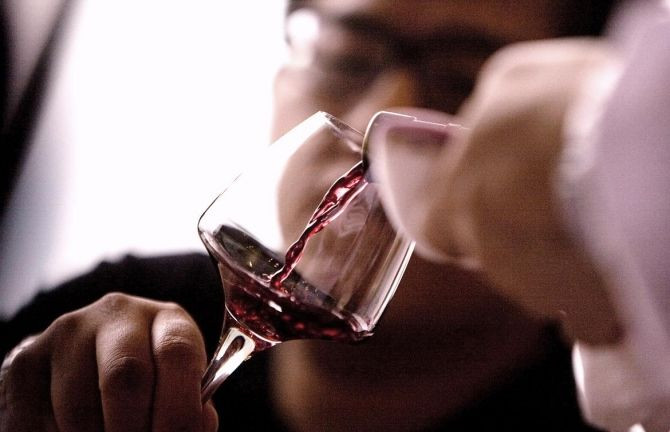Drinking Red Wine May Prevent Cancer, Diabetes and Heart Disease, But Can It Stop Alzheimer's?

Drinking red wine may stave off the development of Alzheimer’s disease, according to scientists researching the compound resveratrol and its benefits.
Resveratrol, a natural compound which has been found in red grapes, red grape juice, red wine, chocolate, tomatoes and peanuts, has been shown to block the molecular mechanisms of aging and prevent diseases associated with aging, such as dementia, diabetes, heart disease and even cancer, in mouse and human observational studies.
"Most resveratrol studies showing any health benefits have been conducted in animal models, such as mice, and with doses that far exceed intake from sipping wine or nibbling on chocolate," lead researcher Dr. Scott Turner, director of Georgetown University Medical Center's Memory Disorders Program, said in a university news release.
Scientists from 26 academic institutions, affiliated with the Alzheimer's Disease Cooperative Study, will be recruiting volunteers for a first-of-a-kind government-sponsored clinical trial on the effects of resveratrol on patients with mild to moderate dementia caused by dementia, starting Wednesday.
"With this clinical trial, we'll find out if daily doses of pure resveratrol can delay or alter memory deterioration and daily functioning in people with mild to moderate dementia due to Alzheimer's," Turner said. "During this study, we will also test whether resveratrol improves glucose and insulin metabolism in older individuals -- although those who already have diabetes will not be included in this study."
Resveratrol has not been approved by the U.S. Food and Drug Administration to treat Alzheimer’s diseases, and there is no definitive evidence that resveratrol can help slow the disease’s progression, researchers noted.
Only half of the participants enrolled in the study will receive resveratrol, and the other half will receive a placebo in the planned double blind study, a clinical trial where neither the participants nor the experimenters will know if the patient is receiving the placebo or Resveratrol until the end of the study.
Researchers will first determine individual biological markers of the disease in each of the participants by administering baseline tests, and participants randomly selected to receive the resveratrol will be given a daily dose of 1,000 mg, equivalent to drinking about 1,000 bottles of wine a day, according to Turner.
"We're trying mostly to determine the safety of that level, but I think it will be safe. Once we determine that, other studies would still have to be done before anything could be developed for the consumer, but this is a big step," Turner said, according to USA Today.
Researchers said that the upcoming clinical trial will mostly focus on preventing tangles from developing in neurons. Brain cells die and shed tau protein at a quicker rate in Alzheimer’s patients compared to people with normal cognitive function. The tau protein forms into tangles in the brain and disrupts synapses, the way neurons communicate with one another, which is crucial for normal cognitive function.
Researchers are trying to determine whether resveratrol will decelerate and reduce the loss of neurons, as well as determine the safety and tolerability of resveratrol administered twice daily with a dose increase every three months for 12 months.
More than 5.3 million people in the U.S. are suffering from Alzheimer's disease and every 70 seconds, another person develops the mind-robbing disease, according to statistics from the National Institute of Aging.
Participants in the resveratrol phase II trial will be asked to will require a study partner (spouse, friend or caregiver) to visit the Georgetown University Medical Center 10 times over the course of the year of the clinical trial.
Patients will also receive two lumbar punctures (a procedure where a needle is inserted into the lower spine to collect fluid), three MRI scans of the brain, and blood and urine tests during the course of the study, and participants must abstain from eating or drinking large quantities of foods or beverages that contain resveratrol, and abstain from taking dietary supplements containing resveratrol during the 12-month study, according to the researchers.



























